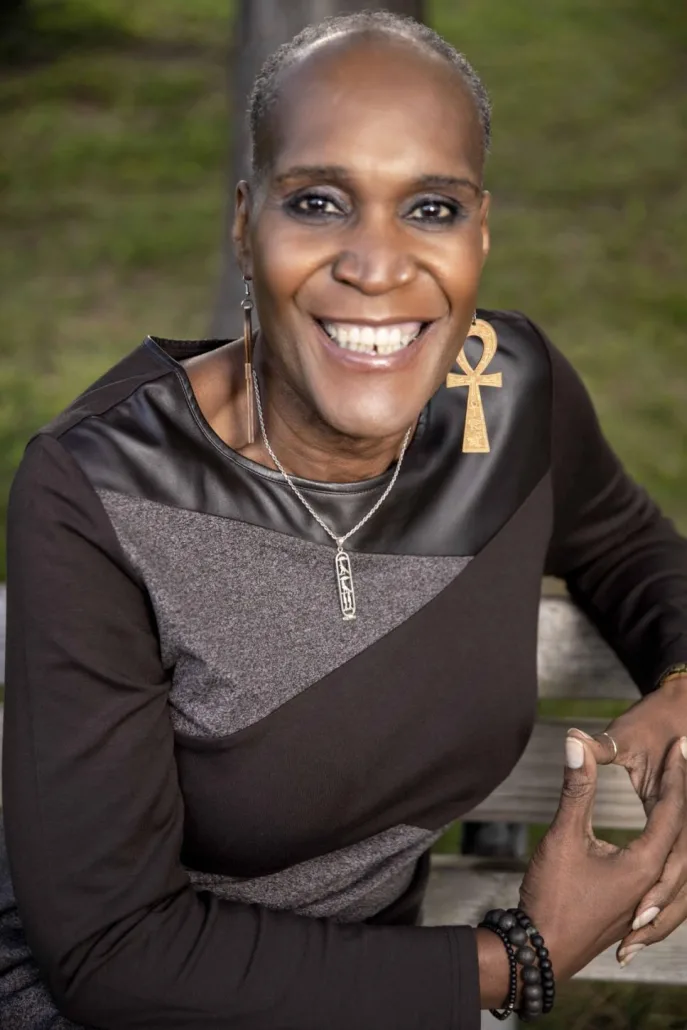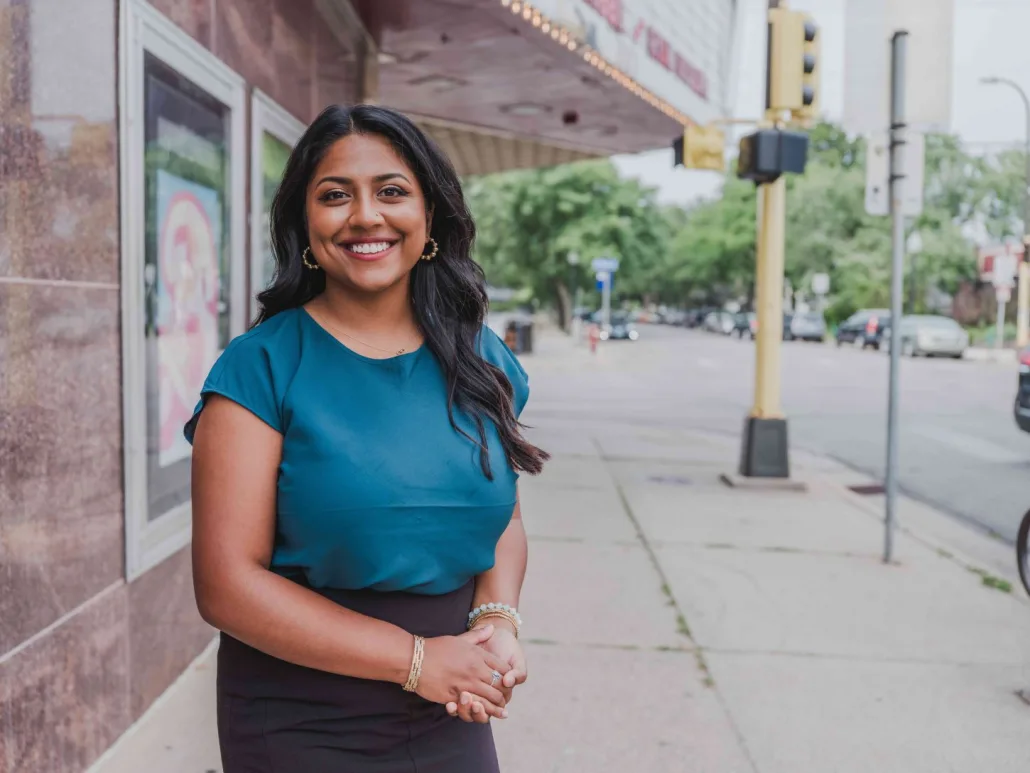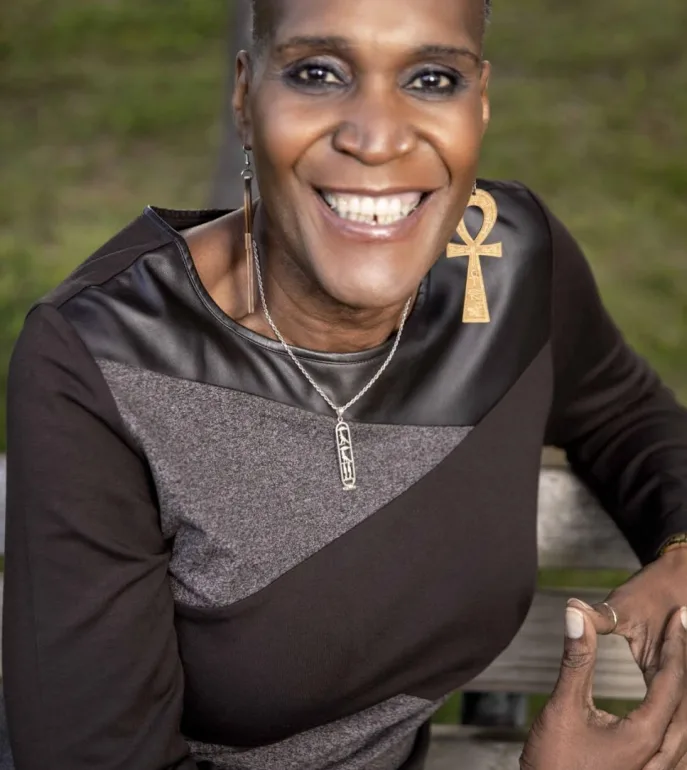2023 “Diversity in Politics” coverage was made possible by Women Winning, which builds a coalition of pro-choice people of all backgrounds, identities, and political affiliations to run for public office.
Among the issues that have been directly cited by city council candidates we have talked to from Saint Paul, Minneapolis, and Duluth, the most common priorities named have been about localized solutions to climate change, housing, and public safety.
In this third part of our series talking with some of the 2023 candidates, we dive deeper into what two Minneapolis-based candidates have said about public safety. Andrea Jenkins has been on the city council representing Ward 8 since 2018 and has served as president since 2022. Her ward includes 38th and Chicago, where George Floyd was murdered in 2020. Her primary challenger in the Ward 8 race was seriously wounded by police in protests after Floyd’s murder.
Audrin (aw-reen) Chowdhury is a first-time candidate running for Minneapolis Ward 12. If elected, she would be the first person of color to represent this southern-most ward in the city. She was a former campaign manager with Jenkins years ago, and currently serves as a policy associate with council member Jason Chavez of Ward 9.
We brought Jenkins and Chowdhury together in conversation about several things. This story focuses on their perspectives about how to define and address public safety concerns in Minneapolis.

Andrea Jenkins is running in Ward 8, where she has been a Minneapolis city council representative since 2018
If elected to a next term, Jenkins says, she wants to see movement on George Floyd square that honors his memory “and others who have been murdered at the hands of the police.” She cites the National Museum for Peace and Justice based in Montgomery, Alabama, which is dedicated to the 4,400 named Black people killed in racially motivated terrorism between 1877 and 1950. She also mentions the National Museum for African American History & Culture in Washington, D.C. “These are models for how we can create something that’s worthy — the historical significance that George Floyd Square has become,” she says.
Jenkins adds, “I want to note for clarity that I have been developing a plan since 2018, which called for a center for social justice, a center for racial healing, that would be created in that same neighborhood, before the murder of George Floyd. The challenge that a lot of people are not really willing to face up to is that we had [flagged the] disharmony, police brutality, and the need for racial healing long before the murder of George Floyd. The whole world watched that tragedy, and has organized around it, and it has brought some significant changes in our society. Not enough. We still have a lot more work to do. But these issues were clear and present long before May 25, 2020.”
Chowdhury says she is running partly to “build unity within our city council. I think between all 13 council members, there’s so much agreement, there’s so much shared common ground. I want to be a part of lifting data and finding bridges between people and then also with the mayor’s office.”
Chowdhury says she wants to see the development of a “comprehensive, accountable, and responsive public safety system. I name those three qualities because I think those are qualities that we’re currently lacking and want to see in the city of Minneapolis that will foster trust in local government and our public safety system.”
In terms of being responsive, she says, all city council candidates recognize that the Minneapolis police force is understaffed. To improve those numbers will take time and intention. “I will support efforts to get Minneapolis community members as officers, especially mid-career folks.”
For a comprehensive plan, conversations that pre-dated George Floyd’s murder indicated that community members want a larger toolbox “to address complex public safety needs,” Chowdhury says, specifically mentioning investing in youth programs to reduce crime by young people and addressing the mental health crises linked to substance abuse.
Chowdhury’s father is a licensed therapist specializing in substance use and alcohol treatment. The two of them talk about the lack of resource to navigate the system for chemical dependency issues. “If you have power and privilege and money and means, you’re better able to access help, but that’s not only who is struggling. Local government needs to do a better job of strengthening our social safety net.”
She adds, “I’m really interested in digging into the creative solutions to prevent issues that we see around drug use, mental health issues, overdoses, people becoming unhoused — and then creating an immediate response that can help triage people in need right now. We need to reduce and prevent the cycle from continuing.”

Aurin Chowdhury, candidate in Ward 12 for Minneapolis city council (photo by Drew Arrieta)
Regarding accountability, she continues, “We have two investigations done by the state and federal government indicating violations of state, federal and constitutional law. It is now on the City of Minneapolis to ensure that we follow the court enforceable document from the state and the recommendations from the federal government to change the Minneapolis Police Department structurally and culturally.
“The oversight capacity of the City Council is going to really matter. I have a really strong value around police accountability, and talking about it honestly and bluntly, because we need to as the city of Minneapolis.”
Jenkins responded by saying, “Accountability is probably one of the biggest challenges in policing, certainly in Minneapolis. But also throughout the country. I supported a ballot question two years ago that failed, yet led to a new continuum of public safety. We have created the Office of Public Safety and hired a commissioner to oversee that office. The office is comprised of the Minneapolis police department, Minneapolis fire department, our 911 services, emergency management, and a new department that we’re calling the office of neighborhood safety, which encompasses our Office of Violence Prevention, as well as behavioral crisis response team that addresses community members who are facing mental health crisis.
“A large majority of the police-involved shootings involve persons experiencing mental health crisis, so we are building that system,” she adds. “It’s still in its very formative stages. Literally just this week we swore in the new Commissioner of Public Safety, and we hired a new police chief who says he is committed to holding officers accountable. We have seen the dismissal of some officers who have been derelict in their duties. But we need to see more.”
Jenkins authored the Community Commission on Police Oversight, with a majority representation in police oversight by community members. “We have more training, more opportunities for everyone to get involved in looking at these cases and offering their feedback. That process is growing and developing, and we’re hoping it will be a mechanism to hold police accountable.”
She says police know how to do their jobs respectfully — there is training on implicit bias and de-escalation — “but we need anti-racist training. After the murder of George Floyd, I declared racism as a public health crisis. You can’t tell me that Derek Chauvin doesn’t know how to do the police officer’s job. He was a training instructor. But in encounters with [people of color] — including children and women — they got put in a chokehold. To me, that demonstrates racism.
“Racism exists in the city of Minneapolis, just like it exists in every institution in our society. We have to be diligent about rooting it out.”
Jenkins says that the same issues we read about in southern states are present among Minnesotans as well. “In Florida, some say they are going to ‘crush the woke people,’” she says. “If we don’t hold on to our majority in the Senate and the House, I can guarantee you we will be talking about how to bring back women’s reproductive rights; how to bring back transgender and gender nonconforming people’s rights; how to make sure that people who have criminal histories can vote again. Because all of that will go away in a heartbeat. And we only have a one-seat majority in the House. If we go to sleep at the wheel, there will be issues right here at home in Minneapolis.”





